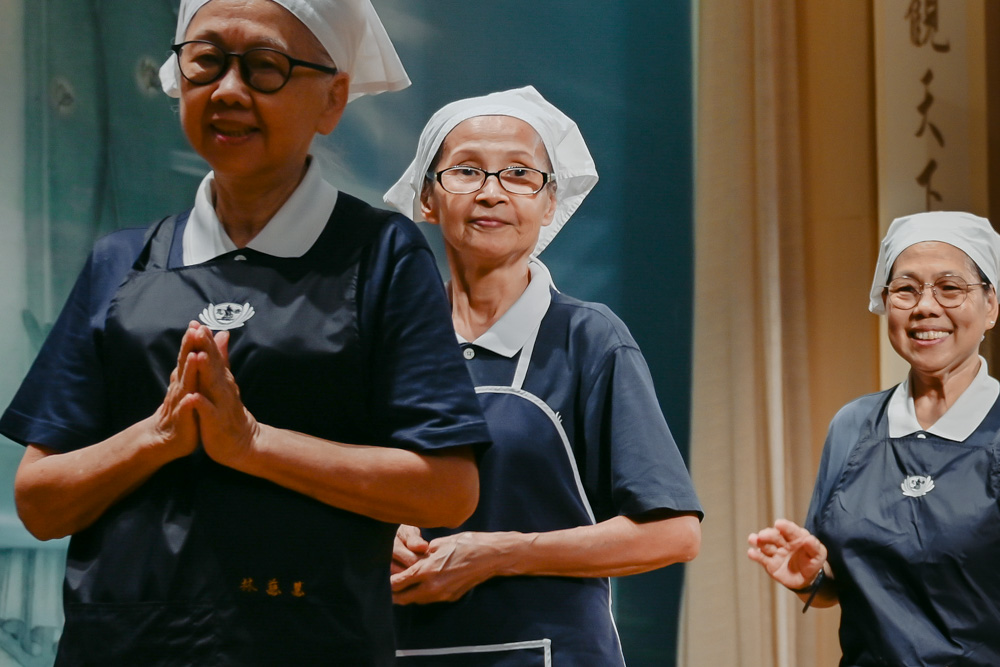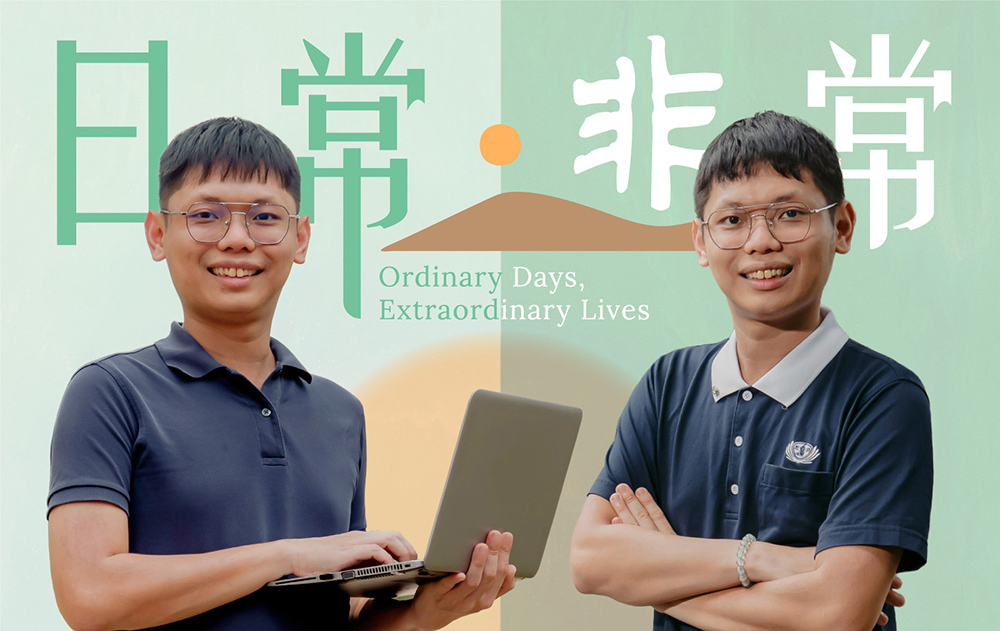
At noon, Gan Ming De was getting photographed at Yishun Pond Park. Clad in blue top and white pants, he exuded a youthful energy as he gracefully strode alongside the pond in his volunteer uniform. At the photographer's directing, he walked briskly while striking poses and making his best effort to flash a smile for the camera. Adjacent to the park stands Tzu Chi Humanistic Youth Centre, Gan only had a brief 25-minute window for the photoshoot before heading to the centre to resume his busy schedule leading a sizable group of Tzu Chi Youths (also known as Tzu Ching) in a group study session.
In an age marked by excessive information and cutthroat competition, Gan reckoned that maintaining a pure heart is not easy. As the world undergoes phases of "formation, existence, disintegration and emptiness", young people must prioritise self-care to navigate away from anxiety and soothe their troubled and restless hearts at all times. It is important that they focus on their task at hand and remain grounded in the realities of the present moment. In recent years, through community programmes spearheaded by Tzu Ching in Singapore, such as mentoring children of care recipients, Gan has been actively involved in guiding his younger peers. He aims to attract like-minded youths to spread loving-kindness within their schools and the wider community.
"If it were a wedding photo, it would be taken this way."
With hands in his pockets, Gan stood sideways as he glanced back, noticing the photographer's dissatisfaction with the shot. Taking the initiative, he proposed adjusting his pose. It was later discovered that during university, as a side job, Gan co-founded a studio with a friend, specialising in wedding videography. With the earned income, they funded and completed their university education without any financial support from their families.
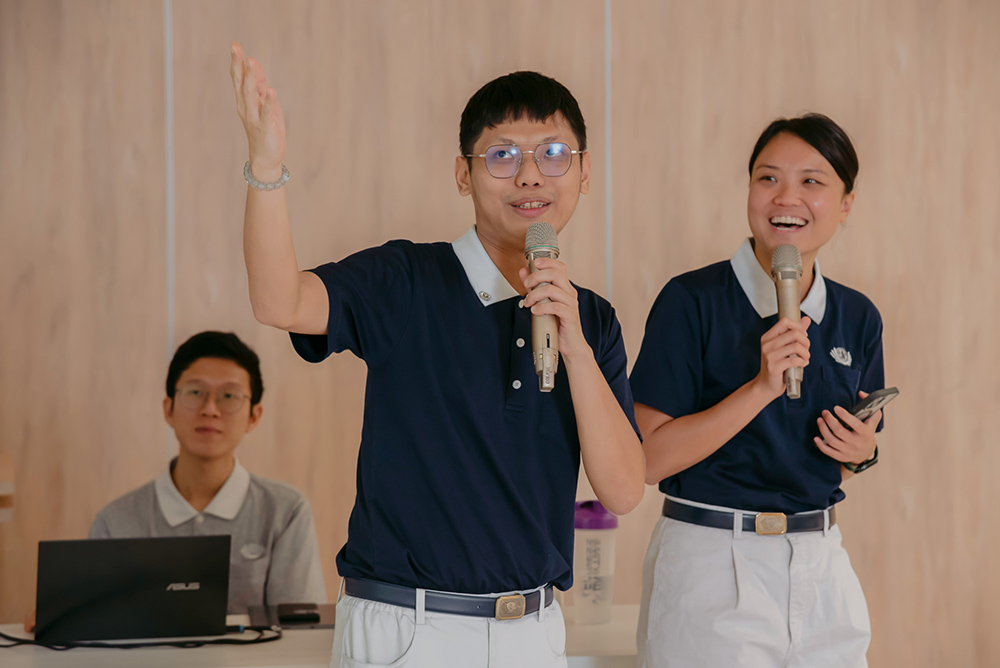 (Photo by Goh Shoo Weng)
(Photo by Goh Shoo Weng)
"I consider myself fortunate to have been certain about my future career path at the age of fifteen or sixteen, sparing me the uncertainties and worries that many face while growing up."
Reflecting on his near-decade experience in film editing, Gan lamented with a hint of pride, "If I were born five or ten years later, I would have been a YouTuber!"
Gan has exhibited a keen sense of trends and adaptability since young. He delved into computer programming at the age of fifteen. Upon completing secondary school in Malaysia, he came to Singapore to further his education in computer engineering. Despite the financial challenges stemming from his father's early passing and the cost of studying abroad, Gan remained undeterred. During his time in Polytechnic, he commuted tirelessly between Singapore and Johor Bahru every day to save money, all while maintaining exemplary academic performance—a feat lauded by his school lecturers.
He later learned how to film and post-produce videos all by himself, eventually launching a business venture with his business partner and became financially independent. Upon graduation, he embarked on a career as a software engineer in a prominent company, steadily advancing his professional trajectory. Starting a family at the age of 30, his success in both career and personal life is akin to a typical modern day success story of “Singapore - Johor Tale of Two Cities”.
Gan said humbly, "I consider myself fortunate to have been certain about my future career path at the age of fifteen or sixteen, sparing me the uncertainties and worries that many face while growing up."
While it may seem advantageous to have such clarity and foresight, Gan encountered considerable misunderstanding from others at a young age.
Having clear aspirations at the time, Gan spent his after-school hours facing the computer. He also withdrew from the Tzu Chi Teenagers Class without seeking permission. "When the Tzu Ching brother came to my house to give me a ride to Jing Si Hall, I hid in my room and ignored him.”
Gan’s father grew concerned that his son was addicted to the computer and was worried that he would neglect his studies. This concern sparked frequent arguments between the father and son, creating a tense and uneasy atmosphere in the family.
Not only was it difficult for Gan to mix with his peers, his father also saw him as rebellious and someone who was difficult to communicate with. In this world, no one can predict the future and most people grow up with varying degrees of traumatic experiences – before Gan could fully mature, his father passed away suddenly without any prior illness or health issue. Gan was 16 years old.
Reflecting back, Gan deeply regretted for the confrontation he had with his father on the day before his father’s passing. He said with anguish, "This life lesson is incredibly painful."
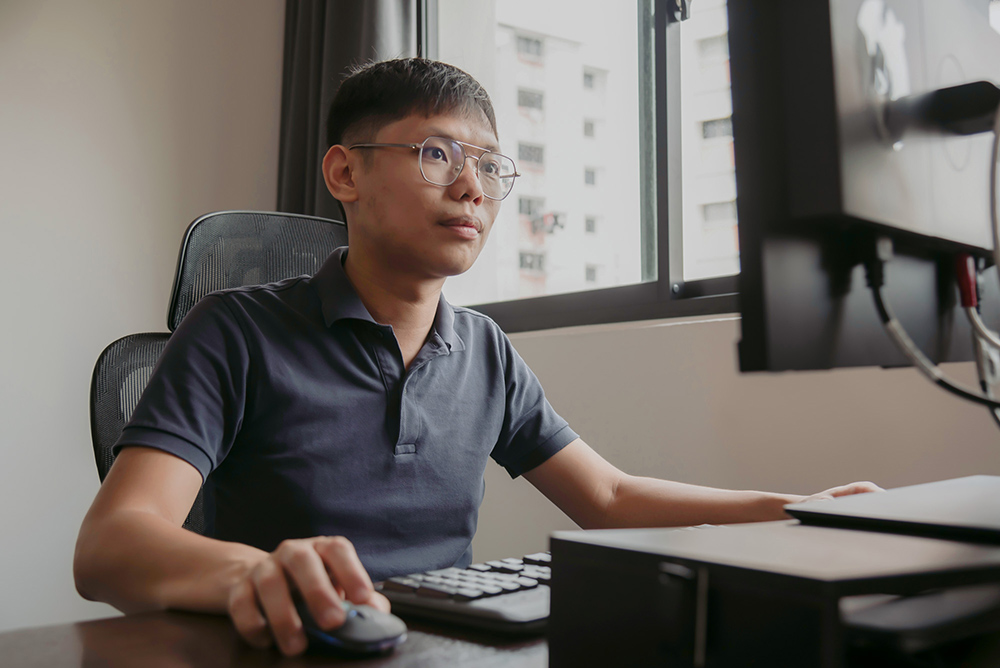
(Photo by Goh Shoo Weng)
"My father sacrificed his life to impart endless wisdom upon his son."
Following his father's death, Gan erected a barrier around himself. He became more guarded and reluctant to extend care to others. He kept his thoughts to himself and refrained from confiding in anyone about his father's passing. It wasn't until a volunteering activity with Tzu Chi, where an incident compelled him to break out of his shell and confront the pain of losing his father.
In 2013, Tzu Ching of Tzu Chi Johor Bahru organised a sign language performance of the adaptation of "The Sutra about the Deep Kindness of Parents and the Difficulty of Repaying It". Gan, who turned 20 that year, had some free time from his school break and thus agreed to assist the stage lighting crew. During the rehearsal, he was struck by the lyrics repeatedly and felt ashamed of his ignorance and rebelliousness.
He admitted with a shrug and a chuckle, "Because of the repeated rehearsals, I was already very familiar with what I needed to do next for the stage lighting. When I felt bored, I started pondering if there were other ways to show my filial piety once more."
At a thanksgiving tea gathering, Gan was invited to share his story on stage. With courage, he admitted to his past "rebelliousness". In a sudden moment of realisation, he understood that his father, who was 43 years his senior, might have thought that his son was spending too much time on the computer and that worried him. Understanding his father's good intention and acknowledging his own ingratitude, Gan was moved by the compassionate and altruistic atmosphere of the gathering, which contrasted sharply with the formal courtesies and detachment often found among young people in the city.
"My father sacrificed his life to impart endless wisdom upon his son," said Gan as he shared how he redefined the meaning of life from his tragic life lesson.
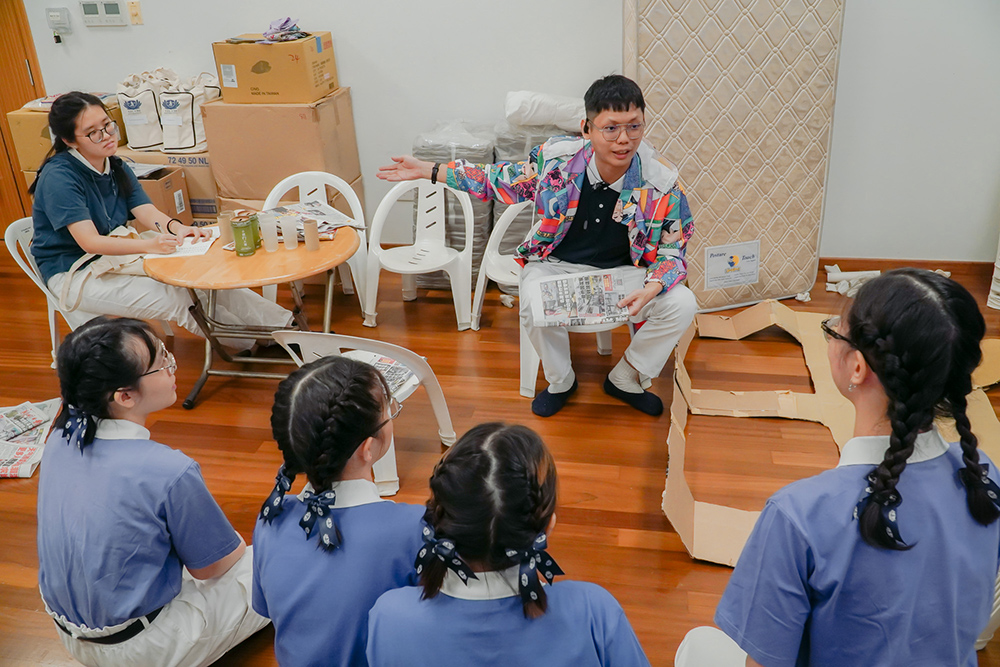
(Photo by Ong Jia Hui)
"Society is too competitive. Young people nowadays can plan the number of internships to take on before they even enter university. Then, they must get a partner before they can apply for a Build-To-Order flat. It’s as though everything in life must happen according to plan, leaving little room for deviation."
Later, Gan became more involved in Tzu Ching as he realised that one should not wait to doing good deeds and being filial, and that school years is the most valuable time to contemplate and reflect on life. Recognising that there are multiple paths in education and life, he acknowledged, "I am a regular Tzu Ching, buy my journey and reasons for joining Tzu Ching may differ significantly from others."
Understanding that everyone progresses at their own pace in life, Gan constantly demonstrates utmost respect and acceptance towards his Tzu Ching peers. For instance, when a teammate decides to leave the team, instead of feeling lost or disoriented, Gan would understand and respect his teammate’s decision.
He said that as individuals mature and step into society, perspectives may shift, especially in bustling modern societies where the pursuit of fame and fortune is not uncommon. One might adopt a more pragmatic approach upon experiencing the realities of working life in an adult world. However, he emphasised that everyone is simply trying their best navigating their lives. As long as one strives to live each day to the fullest, their positivity can inspire and uplift those around them.
Gan reminisced the days spent in front of the computer, recognising that every little effort in the past contributes to shaping of the future. Thus, when observing today's youths who feel anxious when they are not conforming with their peers, Gan is able to empathise with them. He also understands that they may not have the luxury of space and time for exploration he once enjoyed.
He lamented that today's young people are moving at a faster pace, leading to new problems that society is not prepared for, just because nobody wants to lag behind. He said, "Society is too competitive. Young people nowadays can plan the number of internships to take on before they even enter university. Then, they must get a partner before they can apply for a Build-To-Order flat. It’s as though everything in life must happen according to plan, leaving little room for deviation."
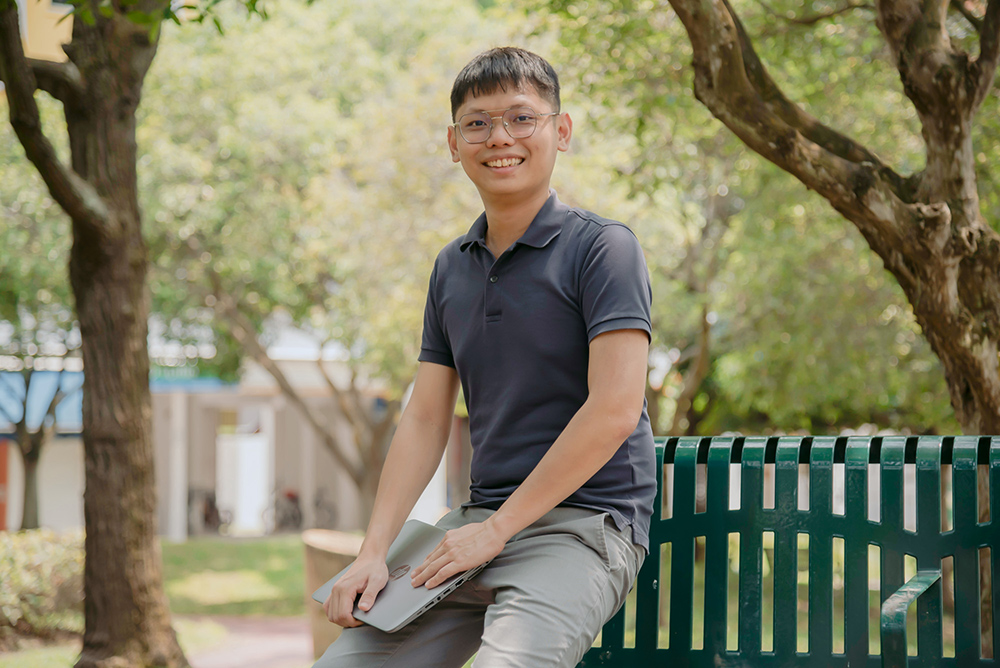 (Photo by Goh Shoo Weng)
(Photo by Goh Shoo Weng)
“I chose a job that has less interaction with people and doesn't 'help society too much'. Otherwise, I would be serving the society 24/7, and I would need to spend more time taking care of myself. This is how I achieve balance at the moment."
The time Gan devotes to both his full-time job, as a software engineer, and volunteering with Tzu Chi may be the same as having two or more jobs at the same time. Not forgetting, he also has to spend time with his family in Johor Bahru.
When asked to share his tips on achieving work-life balance, Gan's response may have seemed “anti-climactically” different as compared to others. He said that to achieve balance between career, family and volunteering, one needs to acknowledge the reality and make necessary trade-offs.
He conceded that if he were to work in sectors like education or healthcare, which have clear societal contributions and significance, he might lack the energy to volunteer. Additionally, he could not envision himself working full-time at Tzu Chi, reasoning, “I chose a job that has less interaction with people and doesn't 'help society too much'. Otherwise, I would be serving the society 24/7, and I would need to spend more time taking care of myself. This is how I achieve balance at the moment."
There could be more than one version to our lives, but how can one consistently live out a fulfilling life? Gan identified a common thread within himself and his peers. Initially, young individuals may join Tzu Ching seeking solutions to their own issues. However, as they immerse themselves in various charitable activities such as environmental protection and elderly care, their focus shifts from self-concern to a desire to serve others, creating value for others.
Gan said, "Discovering the meaning of life through action is key. Witnessing suffering allows one to count their blessings, serving as a lesson in self-preservation and personal growth."

